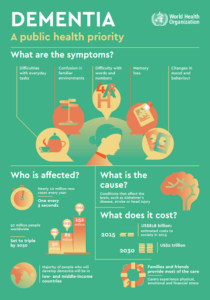In news– The World Health Organization(WHO) released the Global status report on the public health response to dementia recently.
Key highlights of the report
- The report takes stock of progress made to date towards the 2025 global targets for dementia laid out in the WHO’s ‘Global Dementia Action Plan’ published in 2017.
- It uses data from WHO’s Global Health Estimates 2019 and the Global Burden of Disease Study 2019 as well as from WHO’s Global Dementia Observatory (GDO).
- As per the report, only a quarter of countries have a national policy, strategy or plan for supporting people with dementia and their families.
- The report says that the number of people living with dementia is growing.
- WHO estimates that more than 55 million people (8.1% of women and 5.4% of men over 65 years) are living with dementia.
- WHO’s Western Pacific Region has the highest number of people with dementia (20.1 million), followed by the European Region (14.1 million).
WHO’s Global Dementia Observatory (GDO)
- The GDO is the monitoring and accountability mechanism for the Global action plan on the public response to dementia 2017-25.
- It collates data from WHO Member States on 35 key dementia indicators to strengthen countries’ ability to respond to the needs of people with dementia, their carers and families.
About Dementia-
- Dementia is a syndrome – usually of a chronic or progressive nature – that leads to deterioration in cognitive function (i.e. the ability to process thought) beyond what might be expected from the usual consequences of biological ageing.
- It affects memory, thinking, orientation, comprehension, calculation, learning capacity, language, and judgement.
- Consciousness is not affected.
- The impairment in cognitive function is commonly accompanied, and occasionally preceded, by changes in mood, emotional control, behaviour, or motivation.
- Although dementia mainly affects older people, it is not an inevitable consequence of ageing.
- It results from a variety of diseases and injuries that primarily or secondarily affect the brain.
- Alzheimer’s disease is the most common form of dementia and may contribute to 60-70% of cases.
It is currently the seventh leading cause of death among all diseases and one of the major causes of disability and dependency among older people globally.

















